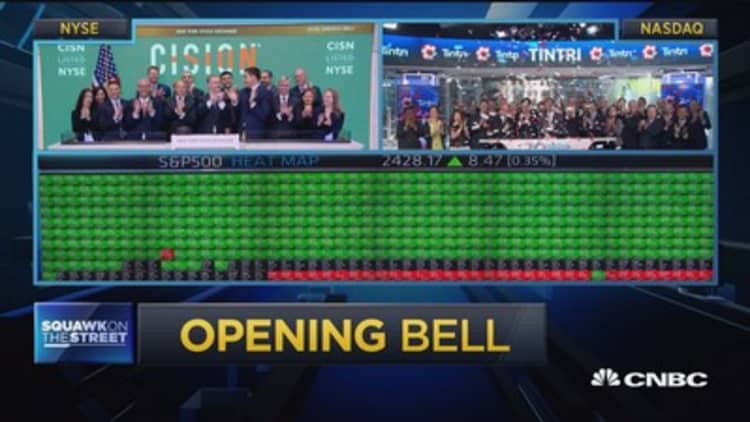Tintri, a company that makes storage hardware for companies' data centers, has had a heck of a ride in the past year.
It went public in June 2017. On Tuesday it said it has filed a voluntary petition for bankruptcy relief — and that, subsequently, the privately held storage company DataDirect Networks was looking to buy Tintri's assets. Tintri also said it was taking out a loan from TriplePoint Capital and hiring a chief restructuring officer. Some of the loan money will go toward paying money owed to employees and contractors.
The trajectory highlights what can go wrong as smaller technology companies seek to go public. Initial public offerings have become more common among tech companies this year.
As a public company, Tintri has faced competition from legacy technology companies such as Dell EMC, Hewlett Packard Enterprise and IBM as well as a few companies that have gone public in recent years — particularly Nutanix and Pure Storage.
Tintri priced shares below its estimated range in its IPO last year, after lowering the amount of money it looked to raise in the deal. Neither of those developments is generally a good sign. Indeed, the company had shown investors that its losses were increasing, not decreasing.
The company's stock closed at $7.27 per share on its first day of trading. The company's market capitalization at the time was above $220 million — almost two years after it raised a $125 million funding round.
Things got worse. In the past year the stock fell a staggering 97 percent. On Tuesday, when trading was halted related to the announcement of the bankruptcy filing, the stock was being traded at 20 cents per share, valuing the company at around $6.7 million.
In the past few months, there were signs of more trouble coming.
In March, CEO Ken Klein resigned. Former Rackable Systems CEO Tom Barton took over.
On May 2 Tintri — based in the heart of Silicon Valley, in the California city of Mountain View — disclosed in a filing that it was assessing whether there is "substantial doubt" about the ability of its business to continue as usual.
Then, on May 18, it released its annual report, which sounded even more ominous:
The filing included an assessment from KPMG, which noted that Tintri probably didn't have enough cash to meet its obligations beyond June 30.
On June 19, Barton resigned.
On June 27, Tintri announced that the board had approved a layoff of 200 employees, which would leave around 40-50 of them remaining.
And it failed to file its earnings statement for the quarter that ended on April 30 — which resulted in Nasdaq sending it a letter on July 3 showing the exchange wanted to delist the stock.
"Unless the Company requests an appeal of the delisting determination, trading of the Company’s common stock will be suspended at the opening of business on July 12, 2018," Tintri said on Tuesday.
And yet, DataDirect is sounding an optimistic note about Tintri.
"DDN is working with Tintri’s co-founders, team members, advisors and creditors to develop a winning plan designed to provide Tintri’s customers with continuity in support of their installed base as well as a winning roadmap for their long-term requirements,” DataDirect CEO Alex Bouzari is quoted as saying in a statement.
"Tintri’s industry leading all flash scale out and automation enterprise storage solutions have been successfully deployed in more than a thousand companies, including 20 of the Top Fortune 100. They are essential tools to help organizations build agile development environments for cloud native applications and run mission-critical enterprise applications better than ever before."



